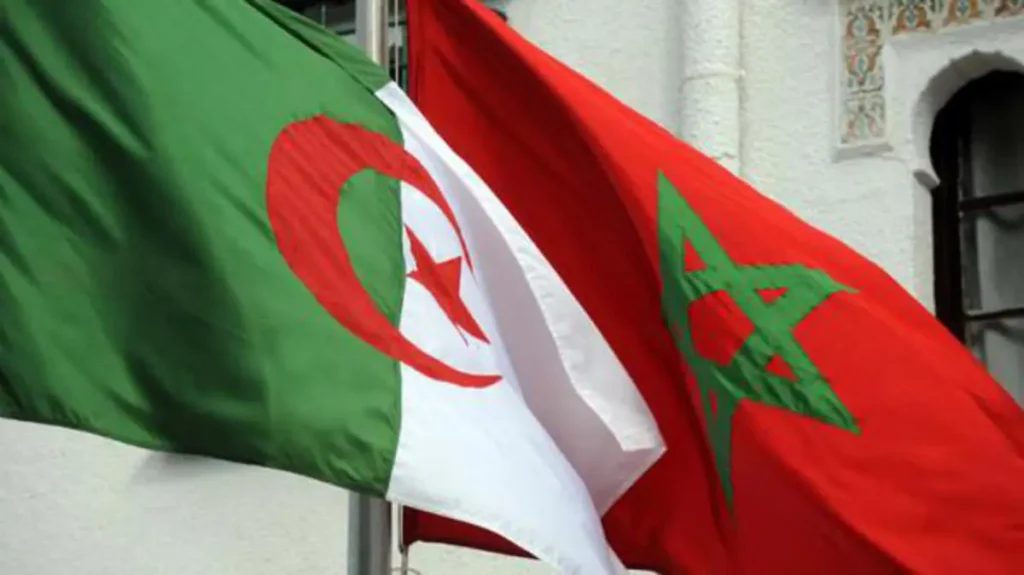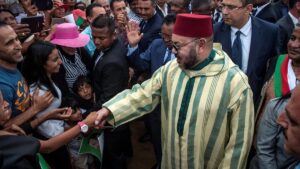Morocco's renewal of its outreach policy toward Algeria: towards reviving Maghreb dialogue and overcoming regional isolation.

Since King Mohammed VI's accession to the throne, Morocco has adopted a political discourse based on the values of peace, good neighborliness, and regional integration, particularly in its relationship with Algeria, which has been affected for decades by chronic political stagnation. Despite this reality, Morocco has remained committed to its "extended hand" policy, stemming from a strategic vision that sees the stability and prosperity of the Maghreb region as only possible by overcoming bilateral differences and building bridges of dialogue and cooperation.
The concept of the "extended hand" in Moroccan political discourse, as expressed by King Mohammed VI, represents a shift in the approach to bilateral relations with Algeria. It is presented not as a circumstantial emotional call, but rather as a strategic initiative reflecting a royal will to transcend the logic of estrangement and build a shared future.
This call has been repeatedly and clearly reiterated in a number of royal speeches, starting with the Throne Speech of July 30, 2018, in which the King affirmed: “We are ready to open a new page in our relations with Algeria, based on mutual trust and constructive dialogue.“This message was repeated on several occasions, becoming an implicit foundation for Moroccan foreign policy toward its eastern neighbor.
In this context, the "extended hand" carries multiple connotations: first, it is a call for dialogue without preconditions; second, it is an expression of Morocco's rejection of the logic of the "eternal enemy"; and third, it is an attempt to dismantle the narrative of artificial hostility that has become entrenched in the Algerian media and official policies.
On the other hand, it does not represent a concession to fundamental principles, but rather embodies what can be called “quiet power,” that is, an initiative toward peace from a position of stability and sovereignty, while preserving national principles, particularly those related to the Sahara issue.
When His Majesty King Mohammed VI says that he extends a hand to Algeria, he does not acknowledge a permanent enmity, but rather confirms that Morocco is open to... A brotherly and honest dialogue...to overcome differences on issues such as the Sahara, without relinquishing sovereignty or principles. This reflects:
Belief in Maghreb unity.
The desire to heal the historical rift.
Rejecting the logic of the “eternal adversary”, and replace it with the logic of “potential partner.”
In short, “extending a hand to an opponent or a neighbor” is not a concession, but rather it is… A courageous offer of peace from a position of strength and responsibility, andWhen Morocco repeatedly extends its hand to Algeria in official royal speeches, it is not abandoning the Sahara issue. Rather, it is affirming that the dispute must not obstruct the shared destiny of the two peoples, and it is presenting Algeria with two choices: openness and cooperation, or continued stagnation.
In his Throne Day speech in 2025, King Mohammed VI reiterated his explicit call for Algeria to open a new page in bilateral relations, affirming that “the bonds of brotherhood and shared history are stronger than any passing disagreement,” and emphasizing that “Morocco will always remain ready for dialogue without preconditions.” This speech was not isolated from a consistent political orientation expressed by the Moroccan monarch on more than one occasion; rather, it complements a series of initiatives he has launched since 2008, which aimed to soften Algeria’s position and establish a logic of partnership rather than conflict.
The "extended hand" policy represents one of the most prominent expressions of Morocco's vision for turning the page on tensions with Algeria. At its core, it reflects a desire to transcend the logic of the Maghreb Cold War and move toward building a regional order based on shared interests. This policy does not stem from a position of weakness, but rather from Morocco's deep belief that North Africa's stability lies in a historic reconciliation between the two neighboring countries.
In essence, the "extended hand" means rejecting the logic of isolation and permanent hostility, and calling for overcoming differences through dialogue and negotiation. It thus represents a first step toward reshaping strained relations on new foundations. According to international cooperation theory (Keohane & Nye, 1977), direct dialogue is a central tool for reducing conflicts and building trust. A classic example of this is the United States' opening of diplomatic dialogue with China in the 1970s, which paved the way for major strategic shifts.
The "extended hand" is often a declaration of diplomatic goodwill, intended to reassure the other party and affirm the desire for a peaceful and balanced solution. It serves as a symbolic commitment to peace, reflecting a state's maturity and ability to open up without compromising its fundamental principles. In this context, the 2002 Arab Peace Initiative reminds us of how diplomatic goodwill can be used as an entry point to launch constructive dialogue, even on the most difficult issues.
The "extended hand" is both a political and moral stance, shifting the state from a position of reaction to one of initiative. Through this policy, Morocco presents itself as a responsible party that rejects isolation and holds the other party responsible for the continued estrangement. According to social relations theory (Wendt, 1999), symbolic initiatives constitute mechanisms for reshaping roles and identities between states, paving the way for long-term understandings.
It is important to emphasize here that an extended hand in no way implies abandoning vital interests or sovereign issues. It is simply an offer to resolve conflicts through political means rather than confrontation. As Joseph Nye (2004) points out, the use of "soft power" is an expression of strategic awareness and the ability to lead change from a position of influence rather than coercion.
The outstretched hand embodies the importance of diplomacy in establishing the foundations of peace and security in the international system. It is a tool for transforming conflicts from their violent forms into constructive dialogues, allowing states to maintain their sovereignty and enhancing respect for international law. According to the social construction theory of international relations (Adler, 1997), these initiatives reshape perceptions and roles among states, facilitating cooperation.
Opportunities for Maghreb Cooperation: Possible Gains from Algeria's Response to Morocco's Outstretched Hand
If Algeria responds to Morocco's extended hand, this could lead to major strategic and development gains for both the Moroccan and Algerian peoples. These include: ending the political rift and opening channels of diplomatic dialogue, which would contribute to calming regional tensions; reviving the Maghreb Union project and achieving economic integration that would strengthen the region's negotiating capacity on the international stage; enhancing trade and human exchange between the two countries, which would positively impact job opportunities and improve living standards; unifying efforts on regional security issues, particularly in the fight against terrorism and irregular migration; jointly exploiting resources, such as energy projects and land and logistical connectivity, particularly across the Atlantic; and alleviating the psychological and political burdens on peoples who have been victims of hostile rhetoric and isolation for decades.
The outstretched hand policy pursued by Morocco, under the leadership of King Mohammed VI, is not only a step toward ending a chronic bilateral crisis; it also carries a forward-looking approach aimed at achieving a genuine détente in relations between Morocco and Algeria, offering multiple strategic gains for both countries and the entire Maghreb region. On the economic front, rapprochement opens up promising prospects for the creation of a unified Maghreb market comprising more than 100 million people, enhancing the region's investment attractiveness and increasing its negotiating power in the face of major economic blocs.
In light of the ongoing geopolitical transformations, Moroccan-Algerian cooperation is a crucial element in rebuilding regional balances based on the logic of integration rather than hostile competition, particularly on issues such as energy security, migration, and the fight against terrorism in the Sahel and Sahara.
On the symbolic and political level, overcoming the rift sends a powerful message to the peoples of the region and the world that the logic of reconciliation and openness is possible in the Arab world. This would put an end to decades of institutional stagnation that have characterized the "Maghreb Union" and provide renewed impetus to the idea of Maghreb unity as a strategic choice, not merely a historical slogan.
Improving relations between the two neighbors could also contribute to a gradual settlement of the Western Sahara issue through calm negotiation mechanisms that preserve Morocco's sovereignty, take into account Algerian sensitivities, and move this issue beyond the logic of zero-sum confrontation and toward a realistic political solution.
In conclusion, the experience of the "Extended Hand" initiative highlights how politics can take a different path in confronting chronic crises by adopting approaches based on dialogue, trust, and quiet strength. However, the success of this initiative is directly linked to the ability of the other party, Algeria, to overcome old mentalities and internal challenges that favor continued hostility over reconciliation.
Through this policy, Morocco demonstrates that peace is not a concession, but a strategic choice. While it adheres to its sovereignty and principles, it is always ready for constructive and responsible dialogue, seeking Maghreb unity that will bring prosperity to the peoples of the region. The question remains whether Algeria is willing to shift its strategy and respond positively to the "extended hand," ushering in a new era of cooperation and integration in North Africa.





